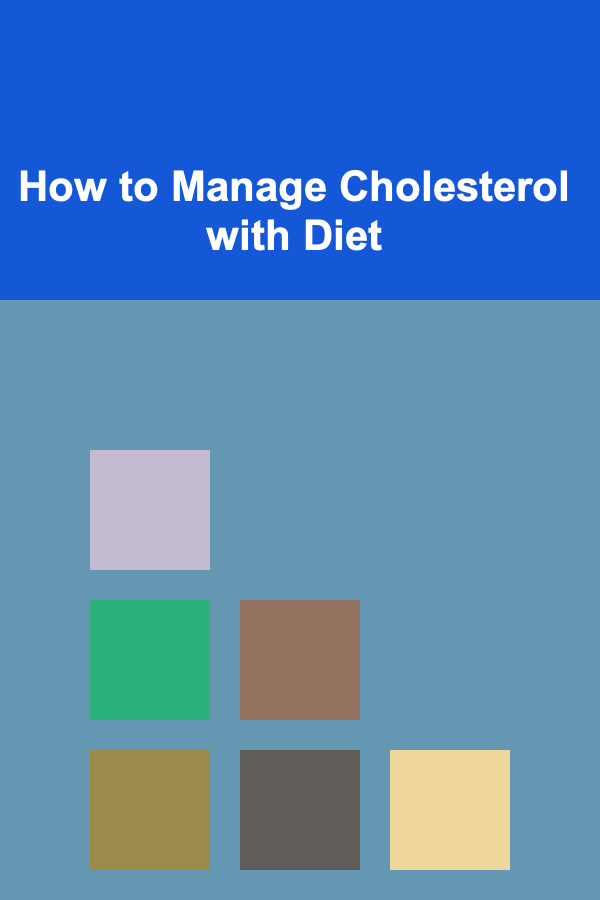
How to Manage Cholesterol with Diet
ebook include PDF & Audio bundle (Micro Guide)
$12.99$11.99
Limited Time Offer! Order within the next:

Cholesterol is a type of fat that is essential for the body, playing a key role in producing cell membranes, hormones, and vitamin D. However, when cholesterol levels in the blood become too high, it can lead to the build-up of plaque in the arteries, increasing the risk of cardiovascular diseases, including heart attacks and strokes. High cholesterol is often linked to lifestyle factors, particularly diet. While medication can help manage cholesterol, diet plays a critical role in maintaining optimal cholesterol levels.
In this article, we will explore how diet influences cholesterol levels and provide practical advice on managing cholesterol through dietary choices. We will delve into the types of cholesterol, foods to include and avoid, and tips for creating a cholesterol-lowering eating plan.
Understanding Cholesterol
1.1 What is Cholesterol?
Cholesterol is a fatty substance that is carried through the bloodstream by lipoproteins. There are two primary types of cholesterol:
- Low-Density Lipoprotein (LDL): Often referred to as "bad cholesterol," LDL carries cholesterol from the liver to the arteries. High levels of LDL can lead to the build-up of plaque in the arteries, increasing the risk of atherosclerosis (narrowing of the arteries) and cardiovascular diseases.
- High-Density Lipoprotein (HDL): Known as "good cholesterol," HDL helps remove cholesterol from the bloodstream and carries it back to the liver, where it can be processed and eliminated from the body. Higher levels of HDL are associated with a lower risk of heart disease.
1.2 Triglycerides
Triglycerides are another type of fat found in the blood. Elevated triglyceride levels can also contribute to the hardening and narrowing of the arteries. They are often associated with high carbohydrate intake, obesity, and excessive alcohol consumption.
1.3 The Impact of Cholesterol on Heart Health
High levels of LDL cholesterol, low levels of HDL cholesterol, and high triglycerides contribute to the formation of plaque in the arteries, which can restrict blood flow and increase the risk of heart disease, strokes, and peripheral artery disease. Understanding how to manage cholesterol levels through diet is essential for maintaining cardiovascular health.
How Diet Affects Cholesterol Levels
Diet is one of the most important factors influencing cholesterol levels. The foods you eat can raise or lower your cholesterol levels, depending on their composition. Specifically, the types of fats and fibers in the diet have the most significant impact on cholesterol.
2.1 Fats and Cholesterol
Dietary fats play a key role in regulating cholesterol levels. Here's how different types of fats affect cholesterol:
- Saturated Fats: These fats are found primarily in animal-based products such as fatty cuts of meat, butter, cheese, and full-fat dairy products. They can increase LDL cholesterol levels, which is why it's recommended to limit saturated fat intake to no more than 5--6% of total daily calories.
- Trans Fats: Trans fats, often found in processed foods like baked goods, margarine, and fried foods, raise LDL cholesterol and lower HDL cholesterol. Trans fats are harmful to heart health and should be completely avoided.
- Unsaturated Fats: Unsaturated fats, found in plant-based oils (olive oil, canola oil), nuts, seeds, and fatty fish (salmon, mackerel), are beneficial for heart health. They can help lower LDL cholesterol and raise HDL cholesterol.
2.2 Fiber and Cholesterol
Dietary fiber, particularly soluble fiber, can help reduce LDL cholesterol levels. Soluble fiber binds to cholesterol in the digestive tract, preventing its absorption into the bloodstream. Good sources of soluble fiber include:
- Oats
- Barley
- Beans and legumes
- Apples
- Carrots
- Psyllium
In addition to soluble fiber, insoluble fiber---found in whole grains, vegetables, and fruits---promotes overall gut health, but it does not directly affect cholesterol.
2.3 Plant Sterols and Stanols
Plant sterols and stanols are compounds found in plants that can help lower cholesterol. They work by blocking the absorption of cholesterol in the digestive tract. These compounds are naturally present in foods like fruits, vegetables, nuts, and seeds, and they are also available as supplements or fortified foods like margarines.
Foods to Include in a Cholesterol-Lowering Diet
A heart-healthy diet can help manage cholesterol levels by focusing on foods that promote lower LDL and higher HDL cholesterol. Here are some key foods to include in your diet:
3.1 Oats and Whole Grains
Oats, barley, and other whole grains are rich in soluble fiber, which helps lower LDL cholesterol. They also provide important nutrients like B vitamins, iron, and magnesium. Starting your day with oatmeal or whole-grain cereal is a simple way to include fiber in your diet.
3.2 Nuts and Seeds
Nuts (such as almonds, walnuts, and pistachios) and seeds (flaxseeds, chia seeds) are excellent sources of unsaturated fats, fiber, and plant sterols, all of which help improve cholesterol levels. Consuming a small handful of nuts or seeds each day can support heart health.
3.3 Fatty Fish
Fatty fish like salmon, mackerel, sardines, and trout are rich in omega-3 fatty acids, which have been shown to lower LDL cholesterol and triglycerides while increasing HDL cholesterol. Aim to eat at least two servings of fatty fish per week.
3.4 Fruits and Vegetables
Fruits and vegetables are high in fiber, antioxidants, and essential vitamins and minerals. They help reduce inflammation, which can contribute to heart disease. Aim to include a variety of colorful fruits and vegetables in your meals for maximum health benefits.
3.5 Legumes
Beans, lentils, chickpeas, and other legumes are packed with soluble fiber and protein, making them excellent choices for lowering cholesterol. Legumes are also low in fat, making them a heart-healthy alternative to animal-based proteins.
3.6 Olive Oil and Avocados
Olive oil is a rich source of monounsaturated fats, which can help lower LDL cholesterol while raising HDL cholesterol. Avocados are another excellent source of monounsaturated fats, along with fiber, potassium, and antioxidants.
3.7 Whole Fruits
Fruits such as apples, pears, berries, and citrus fruits are rich in pectin, a type of soluble fiber that can help lower cholesterol levels. Additionally, fruits provide vitamins, minerals, and antioxidants that support overall heart health.
Foods to Avoid for Cholesterol Management
In addition to adding heart-healthy foods to your diet, it's equally important to reduce or avoid foods that can raise LDL cholesterol or promote inflammation. Here are some foods to limit or avoid:
4.1 Saturated Fats
Foods high in saturated fats, such as fatty cuts of meat, full-fat dairy products, butter, and processed meats (like sausages and bacon), can raise LDL cholesterol levels. Choose lean meats, low-fat dairy, and plant-based oils instead.
4.2 Trans Fats
Trans fats, often found in commercially baked goods, snacks, and fast food, are particularly harmful. They not only raise LDL cholesterol but also lower HDL cholesterol, making them doubly harmful to heart health. Always check food labels for "partially hydrogenated oils," which indicate the presence of trans fats.
4.3 Refined Carbohydrates and Sugars
Excessive intake of refined carbohydrates, such as white bread, pastries, and sugary snacks, can contribute to high triglyceride levels and lower HDL cholesterol. Replace refined carbs with whole grains and limit sugar intake to promote better cholesterol balance.
4.4 Processed Foods
Many processed foods contain unhealthy fats, sugars, and sodium that can contribute to elevated cholesterol and overall poor cardiovascular health. Reducing processed food consumption and cooking more at home can give you better control over the ingredients in your meals.
4.5 Fried Foods
Fried foods are often cooked in oils high in trans fats and saturated fats, both of which can raise LDL cholesterol and lower HDL cholesterol. Opt for grilling, baking, or steaming instead of frying when preparing foods.
Other Lifestyle Changes to Support Cholesterol Management
While diet plays a critical role in managing cholesterol, other lifestyle factors are equally important. Here are additional steps you can take to maintain healthy cholesterol levels:
5.1 Exercise Regularly
Physical activity can help increase HDL cholesterol and lower LDL cholesterol and triglycerides. Aim for at least 30 minutes of moderate-intensity exercise most days of the week. Activities like brisk walking, cycling, swimming, and strength training can improve heart health.
5.2 Maintain a Healthy Weight
Being overweight or obese can raise LDL cholesterol and triglyceride levels. Losing even a modest amount of weight (5-10% of your body weight) can help improve cholesterol levels and reduce your risk of heart disease.
5.3 Quit Smoking
Smoking lowers HDL cholesterol and damages blood vessels, contributing to plaque buildup in the arteries. Quitting smoking improves cholesterol levels and reduces the risk of heart disease and stroke.
5.4 Limit Alcohol Consumption
Excessive alcohol consumption can raise triglyceride levels and contribute to high blood pressure. Moderating alcohol intake or eliminating it altogether can help manage cholesterol levels and promote overall health.
Conclusion
Managing cholesterol through diet is an effective and natural way to improve heart health. By focusing on foods that promote healthy cholesterol levels---such as whole grains, fruits, vegetables, nuts, seeds, and fatty fish---and avoiding foods high in saturated fats, trans fats, and refined sugars, you can significantly reduce your risk of cardiovascular disease. Additionally, combining dietary changes with regular exercise, weight management, and other healthy lifestyle choices can lead to long-term health benefits.
Remember, small, consistent changes to your eating habits can make a big difference. Consult with a healthcare provider or a registered dietitian for personalized advice on managing cholesterol through diet and making the best choices for your health.

Best Organization Tools for Studying and Exams
Read More
How to Build an Enriching Indoor Environment for Your Pet
Read More
How to Choose the Best Home Renovation Contractors
Read More
How to Set the Mood with Lighting for Your Home Party
Read More
The Power of Influence: How to Stand Out by Persuading Others
Read More
Finding Profitable Partnerships: A Deep Dive
Read MoreOther Products

Best Organization Tools for Studying and Exams
Read More
How to Build an Enriching Indoor Environment for Your Pet
Read More
How to Choose the Best Home Renovation Contractors
Read More
How to Set the Mood with Lighting for Your Home Party
Read More
The Power of Influence: How to Stand Out by Persuading Others
Read More